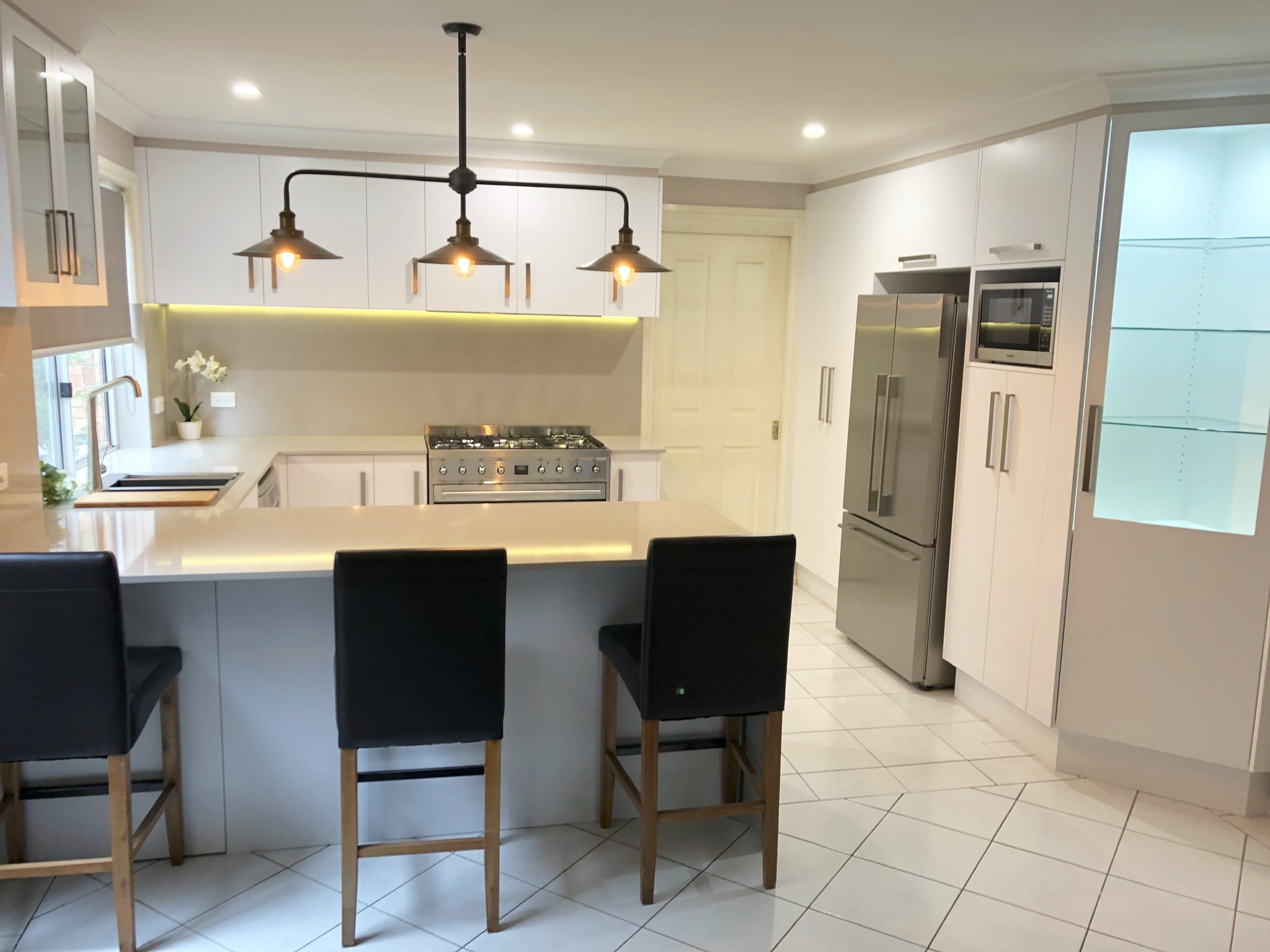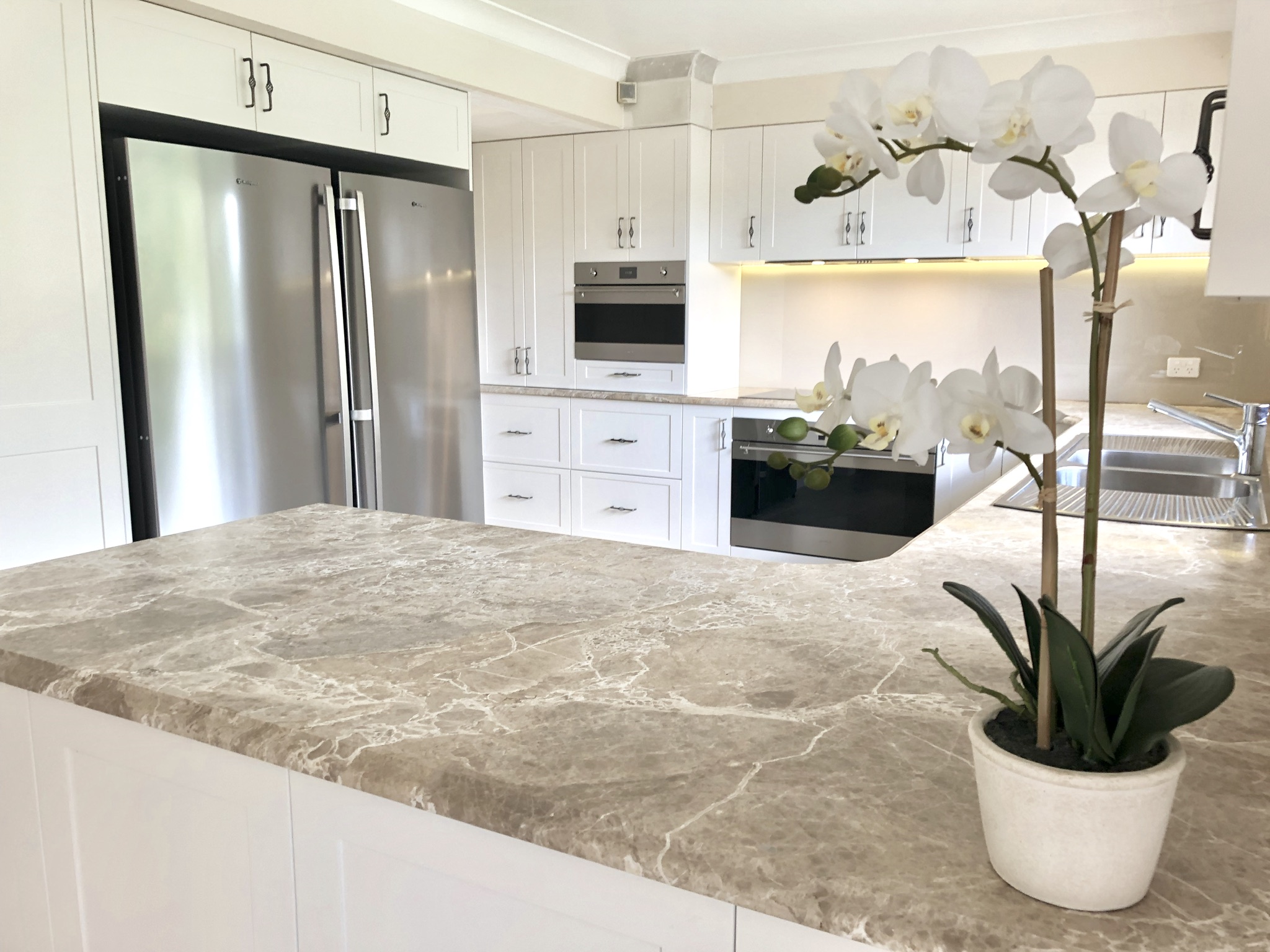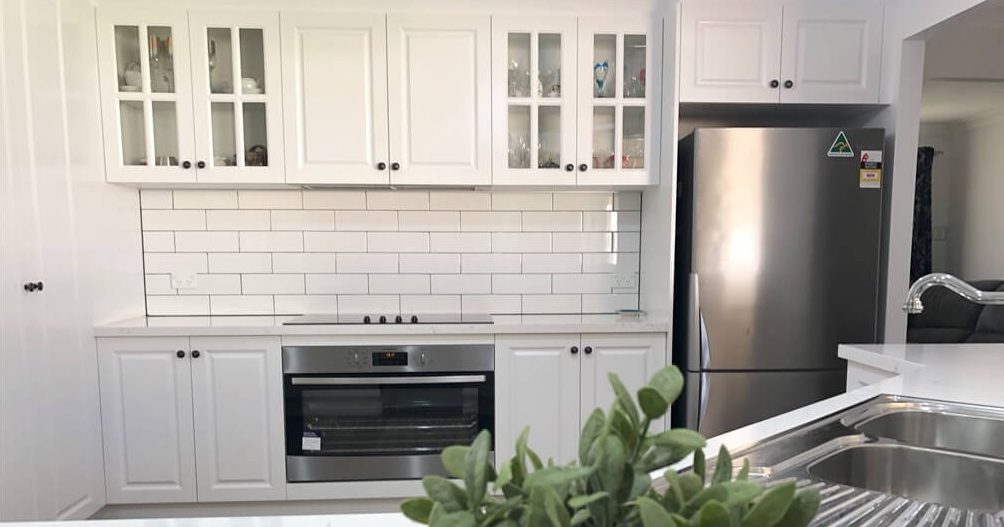Cleaning Tips for a Holiday Ready Kitchen
Kitchens today are the functional powerhouse of the home. Our kitchens are without doubt, the most used area of the house with the bathroom coming in a close second. With school holidays and Christmas upon us, it seems one minute our kitchens are sparkling clean and the next, a mess yet again. The holidays are a time when we do the most entertaining and we want our homes to look their best.

White cabinets, engineered stone benchtops & splashback & stainless steel appliances – kitchen renovation by Master Bathrooms & Kitchens.
Cleaning your kitchen doesn’t require expensive or harmful cleaners. In fact, avoiding the use of these is not only cheaper and safer for your health but also avoids damaging the finish of your cupboards, benchtops and appliances. Here are our kitchen cleaning tips to keep your kitchen guest ready:
Cabinets
For greasy and tough jobs, start first with a simple mixture of liquid dish soap and warm water, using a soft cloth dampened with this mixture wipe away grease and food being sure to not miss edges and sides of your cabinets. Then using a second dry microfibre cloth, dry the area until it is sparkling and streak free. For a quick and simple clean, create a mixture of vinegar and water into a spray bottle, spritz the cupboard with mixture and wipe clean with a microfibre cloth. The use of a slightly dampened microfibre cloth will prevent streaks when cleaning cabinets and will effectively clean any sort of finish. Be sure to never scrub the face of your cabinet doors with abrasive cleaners or scourers.
Benchtops
All types of benchtops from laminate through to natural stone are best cleaned with a little warm soapy water and sponge, then wipe to a shine with a clean, dry microfibre cloth for a streak free finish. Be sure to not use too much soap, just a little, otherwise no matter how much you buff, you will be left with streaks.
Special notes for stone benchtops – Natural stone benchtops particularly granite require annual sealing to avoid staining. Do not use your stone benchtops as a chopping board, you will ruin both your knives and your benchtop. Do not use abrasive cleaners or scourers. Do not place hot things on your stone benchtops, they are heat resistant, not heat-proof and it may cause discolouration or cracks. Do not sit or stand on your stone benchtop. Whilst stone is very strong, be sure to use a ladder, not your benchtop.

Beautiful natural marble benchtops with shaker cabinets – kitchen renovation by Master Bathrooms & Kitchens.
Sinks
Unfortunately with use, stainless steel sinks do become scratched no matter how careful we are. To clean a relatively new stainless steel sink, all that is required is soapy water and a sponge then dry with a microfibre cloth. As your sink ages and retains more scratches and stains, a using bit bicarb soda and water to make a paste or for older sinks a little Gumption on a damp sponge and polish in a circular motion to clean, rinse and buff your sink will help get it back to new.
Stainless Steel Appliances
Stainless steel appliances are beautiful and give your kitchen the ultimate in contemporary design, however they are prone to watermarks and fingerprints and can be difficult to keep clean. Using soft microfibre cloths and a little cheap olive oil does the job nicely. Alternatively, a good quality stainless steel cleaner is ideal, our favourite is one found at BBQ’s Galore as it goes on effortlessly and leaves a streak free finish. First wipe down the surface with a lint free tea towel to remove any dust, then use a damp cloth to remove splash marks and food spills. Once your surface is clean, put a few drops of oil onto your dry microfibre cloth or spray with the stainless steel cleaner and wipe onto the surface being sure to follow the grain of the stainless steel, adding drops of oil to the cloth as needed. Once you have covered the entire area you can then go over the surface with a clean, dry microfibre cloth to remove any excess oil and remove any streaks.
Dishwashers
Run a damp cloth over door seals and contact points. Clean the filter under hot running water and use a plastic brush to gently scrub off debris. Every now and again, usually 2-3 times a year, empty the dishwasher, put a couple of cups of vinegar into a bowl, place on the bottom rack then run the dishwasher on its hottest cycle. This will help flush grease and deposits out of the pipes and remove bad odours.

Stunning white shaker cabinets with Caesarstone benchtops and stainless steel appliances – kitchen renovation by Master Bathrooms & Kitchens.
Ovens & Rangehoods
Regularly wiping out your oven will prevent the need to use caustic oven cleaners. Remove oven racks and soak in the sink with hot soapy water. If your racks fit into the dishwasher, put them on a pot cycle for an easy clean, otherwise soak and scrub with a Steelo wool pad. Make a paste with bicarb soda and water, dab onto the interior of your oven avoiding elements and leave for a couple of hours or overnight for a tougher clean. Use a plastic scraper to remove paste adding water as needed and finally wipe out with damp cloth rinsing as you go. For rangehood filters, popping them into the bottom tray of your dishwasher and using a pot cycle once a month keeps them as clean as new.
Fridges
Remove all food from refrigerator. Remove all drawers and shelves and wash in warm soapy water using a small toothbrush to get into crevices, dry and set aside. Use a mixture of warm water and dishwashing liquid to wipe the interior of fridge, again using an old toothbrush to get into crevices. To remove stubborn stains, use a paste of baking soda and water and leave to set for an hour before wiping clean. Avoid the use of disinfectants and bleaches in your fridge as the chemicals these contain have the potential to make people ill when in contact with food. This is one area where using a natural cleaner is a must.
Related Articles:
3 Steps to a Sparkling Clean Shower
Why you should stop using bleach in your bathroom
How to Create a Clutter Free Bathroom
So there are our tips for cleaning and caring for your kitchen. Master Bathrooms & Kitchens have been renovating bathrooms and kitchens in the Hills District & Hornsby Shire since 1995. If you are considering renovating your bathroom or kitchen call us on (02)9899 9330 for a free measure & quotation.
Watch our a video below of just some of our beautiful bathroom and kitchen renovations.





